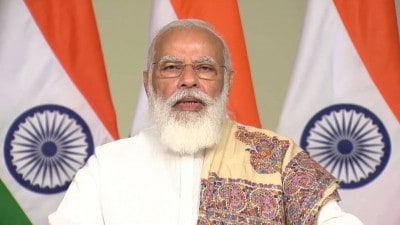New Delhi, Nov 22 : India is not only meeting its Paris Agreement targets but has also been exceeding them, Prime Minister Narendra Modi said at the G20 summit held virtually on Sunday.
In his address at the G-20 Summit side event, “Safeguarding the Planet – The Circular Carbon Economy Approach”, he said that India has taken concrete action in many areas for clean climate.
“We have made LED lights popular. This saves 38 million tons of carbon dioxide emissions per year. Smoke free kitchens have been provided to over 80 million households through our Ujjwala Scheme. This is among the largest clean energy drives globally,” the Prime Minister told the member countries.
Climate change, he said, must be fought not in silos but in an integrated, comprehensive and holistic way. “Inspired by our traditional ethos of living in harmony with the environment, and the commitment of my government, India has adopted low-carbon and climate-resilient development practices,” Modi said.
Giving details about the efforts made by his government, he pointed out the campaign to eliminate single-use plastics. “Our forest cover is expanding; The lion and tiger population is increasing; We aim to restore 26 million hectares of degraded land by 2030; And, we are encouraging a circular economy.”
India is making next-generation infrastructure such as metro networks, water-ways and more, he said. In addition to convenience and efficiency, they will also contribute to a cleaner environment.
The Prime Minister assured that India will meet its goal of 175 Giga Watts of renewable energy well before the target of 2022. “Now, we are taking a big step ahead by seeking to achieve 450 Giga Watts by 2030.”
The International Solar Alliance is among the fastest growing International Organisations, with 88 signatories. With plans to mobilise billions of dollars, train thousands of stake-holders, and promote research and development in renewable energy, the ISA will contribute to reducing carbon foot-print.
Coalition for Disaster Resilient Infrastructure (CDRI)-18 countries — including 9 from among the G20 and 4 international organisations — has already started work on increasing resilience of critical infrastructure to prevent damage during natural disasters.
This is the best time for further increasing research and innovation in new and sustainable technologies, the Prime Minister said. “We should do so with a spirit of cooperation and collaboration. The entire world can progress faster if there is greater support of technology and finance to the developing world.”
For humanity to prosper, every single individual must prosper, he said. Rather than seeing labour as a factor of production alone, the focus must be on the human dignity of every worker. Such an approach would be the best guarantee for safeguarding our planet, the Prime Minister added.
Disclaimer: This story is auto-generated from IANS service.

